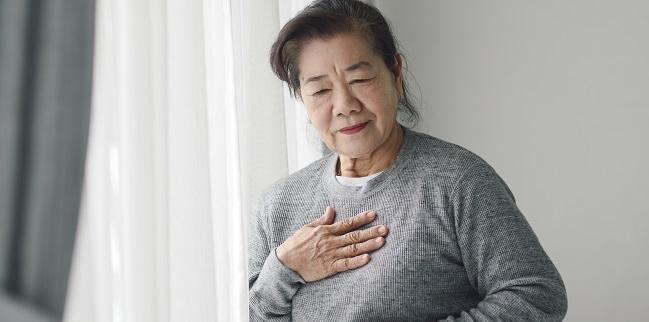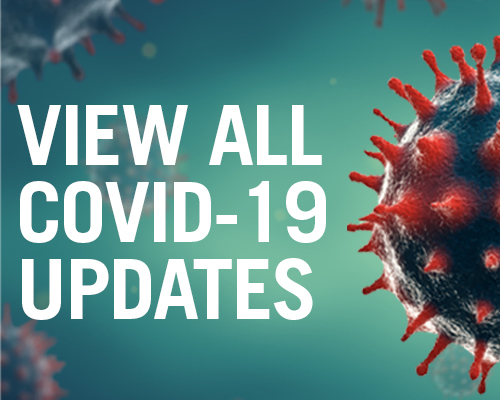Takotsubo Rising During COVID-19? Stress, Viral Triggers Need Attention
Some physicians report an uptick in cases, but the size of the problem needs more study.

The specific mechanism remains unclear and the scope of the problem is still unknown, but something about the COVID-19 pandemic seems to be causing an uptick in Takotsubo cardiomyopathy, clinicians on the front lines say.
Anum Minhas, MD (Johns Hopkins University, Baltimore, MD), who published the first known US case of Takotsubo in a COVID-19 positive patient in JACC: Case Reports this week, told TCTMD that she has seen an increase over the past 6 weeks. “I know clinically when I've taken care of COVID patients, I've seen it more than just this case,” she said. “It's hard to know if it's all Takotsubo or if there's an element of acute inflammation which is contributing, like an acute inflammatory response. The pattern for this patient was so classic for Takotsubo that it seemed to fit well.”

But diagnosing Takotsubo in the setting of this pandemic is tricky, she added, given the other virus-related complications these patients are facing. Takotsubo syndrome is “a diagnosis of exclusion, that's the catch. It's a clinical diagnosis,” Minhas explained. And with other critical complications needing attention, they are not regularly performing coronary angiography in these patients.
Speaking with TCTMD, Julia Grapsa, MD, PhD (Barts Health NHS Trust, London, England), the editor-in-chief of JACC: Case Reports, pointed to a recent case published by Mohammed Dabbagh, MD (Henry Ford Hospital, Detroit, MI), and colleagues that documented Takotsubo cardiomyopathy in a 67-year-old COVID-19 positive patient who initially presented with a large hemorrhagic pericardial effusion.
There is also the Swiss case published by Philippe Meyer, MD (Geneva University Hospitals, Switzerland), and colleagues last month in the European Heart Journal of an 83-year-old COVID-19 patient who developed Takotsubo syndrome.
Stress or Virus?
What’s not clear is the extent to which the telltale characteristics of Takotsubo are directly related to the viral infection or are caused by stress secondary to the pandemic and its economic and social effects. In normal times, Takotsubo—sometimes referred to as the broken heart syndrome—is typically triggered by stress, is most commonly seen in postmenopausal women, and can only be confirmed on coronary angiography. Before the COVID-19 pandemic, patients who developed Takotsubo generally had a better prognosis than those with standard ACS. In the current setting, however, Takotsubo appears less benign.
At his institution, Gennaro Sardella, MD ("Sapienza" University of Rome, Italy), said he has seen four different cases of Takotsubo syndrome in COVID-19 patients since the start of the Italian lockdown in early March. Three of these patients died and the fourth, when he spoke with TCTMD last week, was still intubated.
“Usually Takotsubo syndrome is not lethal—it's not a serious syndrome in most cases,” he said. “In our patients with COVID, the COVID is an important trigger for Takotsubo [and] Takotsubo is strongly related to stress and anxiety.”
Sardella believes there is an unquestionable link between COVID-19 and Takotsubo syndrome, with the former not only causing increased anxiety, especially for those hospitalized and afraid to die, but also potentially worsening the prognosis, he said. “I think the two distress situations empower each other, the COVID and Takotsubo.”
It’s also possible that the COVID-19 infection can trigger inflammation through myocarditis that can also develop into Takotsubo, according to Sardella. This is why “it's fundamental to have the autopsy to see what happened to the heart” in patients who ultimately die with these complications, he said.
Timothy Henry, MD (The Christ Hospital, Cincinnati, OH), senior author of a recent study showing a 38% drop in US STEMI cases since the start of the pandemic, told TCTMD said his institution has only seen two cases of confirmed Takotsubo in the last month. “I expected to see more, not because I think COVID causes Takotsubo, but obviously we're living in an unbelievably stressful time period,” he said, adding that more information will come soon.
I think the two distress situations empower each other, the COVID and Takotsubo. Gennaro Sardella
Henry is part of a team investigating at least 400 patients with confirmed or suspected COVID-19 with ST-elevation or a new left bundle branch block. “Inside that registry, I'm expecting that we'll have some Takotsubo as part of it,” he said. “I think what it's safe to say [is that] this stressful period would be expected to increase the amount.”
Scott Sharkey, MD (Minneapolis Heart Institute Foundation, MN), agreed. “For the infection itself, there is stress, and then the stress of just going through this for everybody in the world,” he told TCTMD. “Now having said that, there's a couple of things about COVID itself that might hide some of this.”
First, Sharkey explained, for various reasons, COVID-19 patients are not receiving tests like echocardiograms routinely. “Many of those that are done are point of care and then maybe by an ICU doctor that may not know what they're looking at in terms of Takotsubo versus a global cardiomyopathy,” he said. Additionally, because COVID-19 often increases troponin in the absence of obstructive CAD, “sometimes the troponin elevation is not paid attention to maybe in the same way it would be in another patient.”
Henry pointed to a recent recommendation published in the American College of Cardiology’s online magazine by James Januzzi Jr, MD (Massachusetts General Hospital, Boston). In it, Januzzi writes: “Given the frequency and nonspecific nature of abnormal troponin results among patients with COVID-19 infection, clinicians are advised to only measure troponin if the diagnosis of acute MI is being considered on clinical grounds and an abnormal troponin should not be considered evidence for an acute MI without corroborating evidence.”
“The question is: is [Takotsubo] increased and will it be increased as a percentage of what we see?” Henry asked. “I don't know, but I think the concept is good and I think raising awareness of it [is important] because clearly everything else we know about stress cardiomyopathy is that in stressful situations you would expect to see an increase.”
For the patients who are in the hospital, especially those who are intubated, Sharkey said, “the clinician has to be very astute” about catching cardiovascular issues on monitors without the patient necessarily complaining of pain. “Any change in the patient's blood pressure, heart rate, oxygenation even reflecting perhaps coexisting heart failure: you've got to start looking for this,” he said. “It would be really valuable to learn how [physicians in COVID-19 hot spots] recognized the coexistence of the Takotsubo in that scenario and others. What was the tip off to them that it was going on?”
Research, Registries Ongoing
“The only precise way to understand the mechanism of how COVID-19 may cause this stress cardiomyopathy is to look directly into the science—something that I believe will happen over the next few months,” Grapsa said.
Autopsy data from China have offered clues as to how COVID-19 directly affects cardiac cells, and more studies are on the way. “Some people mentioned that COVID-19 has been quite aggressive in creating myocarditis, so it would be quite interesting to understand the details,” she noted. However, “I want to clarify that while we know that COVID-19 has been associated with myocarditis, Takotsubo is very interesting because we haven't seen that in the literature—it happens rarely with viruses. . . . It would be quite interesting to understand what's happening.”
If we have a patient who might be more emotional, pay attention: psychological support is very important to them. Julia Grapsa
“We have to wait for the real etiology,” Sardella said. “We suppose that the etiology is the same as Takotsubo, but we really don’t know.” He is now enrolling Takotsubo patients with COVID-19 in an Italian registry. “It’s really the beginning of the story. We don’t know yet what can we do. And, moreover, because the Takotsubo in COVID [can be] lethal, for this reason the outcome is very negative. It’s difficult to know what is better to do. I think that we have to wait to look at more patients, more cases, and to hope that the majority of patients are still alive to understand better the therapy.”
Minhas said she would like to see “both large registries documenting echo findings in patients with COVID to see what the different features are and then whether or not those findings resolve and also studies that might be smaller but would have more detailed information about echo parameters linked with labs.”
In the meantime, Henry said, one of the key messages from the current data is “that you should have a high index of suspicion, and that with or without COVID, stress cardiomyopathy is real and it's out there for sure.” Cardiologists should take the approach of first ensuring proper personal protective equipment in the cath lab and always presuming that patients are COVID-19 positive, he said.
In general, Grapsa said physicians should be keeping an eye out for signs of emotional distress that might trigger a Takotsubo event in their patients who are staying home. “It's very important to support them, to call them,” she said. “If we have a patient who might be more emotional, pay attention: psychological support is very important to them.”
Sardella agreed, adding that national societies and governments should be giving a clear message to the public, especially those with COVID-19 infections, that they must go to the hospital with any signs of a heart attack. “They cannot wait at all,” he said. “They cannot be afraid.”
Yael L. Maxwell is Senior Medical Journalist for TCTMD and Section Editor of TCTMD's Fellows Forum. She served as the inaugural…
Read Full BioSources
Minhas AS, Scheel P, Garibaldi B, et al. Takotsubo syndrome in the setting of COVID-19 infection. J Am Coll Cardiol Case Rep. 2020;Epub ahead of print.
Meyer P, Degrauwe S, Van Delden C, et al. Typical Takotsubo syndrome triggered by SARS-CoV-2 infection. Eur Heart J. 2020;Epub ahead of print.
Dabbagh MF, Aurora L, D’Souza P, et al. Cardiac tamponade secondary to COVID-19. J Am Coll Cardiol Case Rep. 2020;Epub ahead of print.
Disclosures
- Minhas reports receiving support by a National Heart, Lung, and Blood Institute training grant.
- Dabbagh, Grapsa, Henry, and Sardella report no relevant conflicts of interest.


Luis Raposo